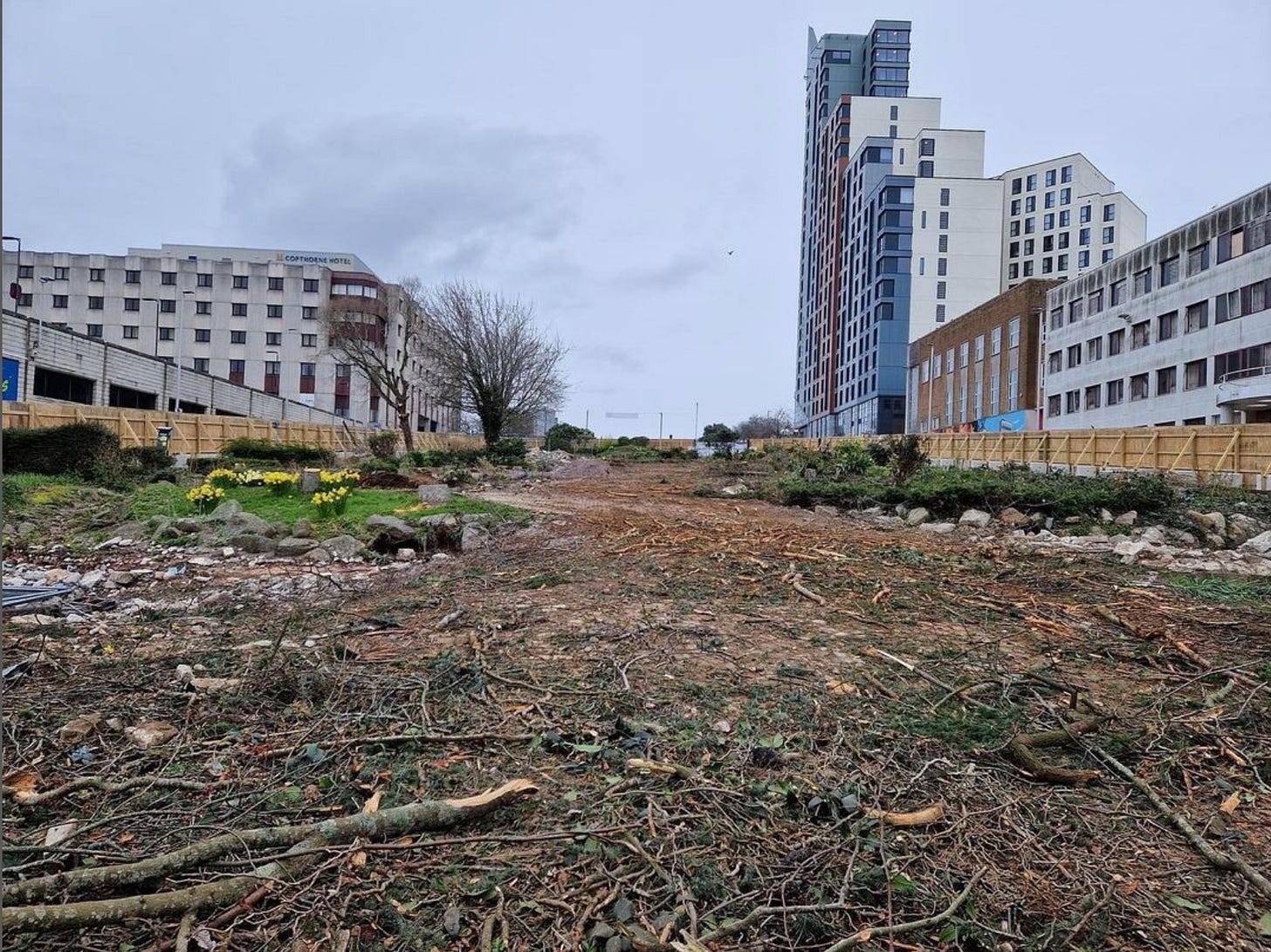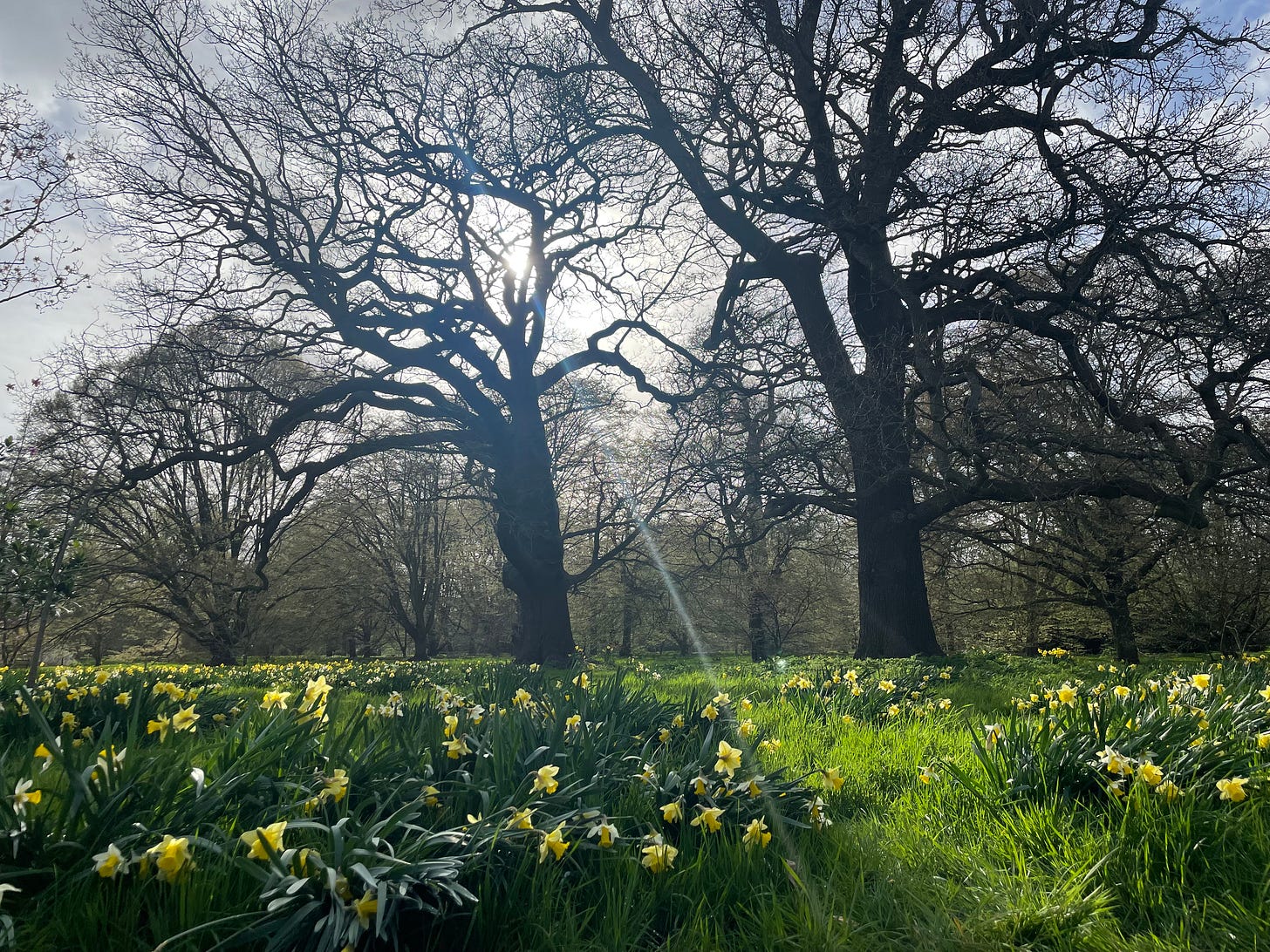Let's talk about trees.
Urban nature superheroes 🌲
Trees. We love them. They give us oxygen. They give us shade. They give us food. They give countless other species shade and food as well. Oak trees alone support 2,300 species, 326 of which are entirely dependent on oak for their survival. Think of nature, and you think of trees.
Trees have a huge role to play in the climate and nature emergencies. You know that trees absorb carbon dioxide and emit oxygen, because you paid attention in school. It’s why they are often toted as being the silver bullet against the climate crisis. It makes sense, right? We could just suck all the carbon out of the air by planting trees.
Of course, it’s not as simple as that.
Trees planted in the wrong place are a waste of time and energy. The 6,000 trees that Kings Lynn council planted as part of a ‘rewilding’ project all died within a few months. A short review revealed that many trees hadn’t even been planted in the soil, just kind of dropped into the plastic guards. They were planted in May, when the conditions are too hot and dry (trees should be planted between October and April), and they were planted in a wildflower meadow which was already doing a sterling job of absorbing carbon from the atmosphere.
Trees also take a long time to mature. Forests don’t grow overnight. A hundred-year-old oak plays a very different role in an ecosystem than a three-year-old sapling. Ancient woodland is not only holding more carbon, but it releases that much more when it is cut down. It’s vital to protect them.
So it won’t surprise you at all to hear that our ancient trees are under threat. But why? Tropical deforestation is increasing, mainly driven by demand for commodities like soy, palm oil, timber, and cattle. But we don’t produce any of those things in the UK.
Well, we’ve done an excellent job of chopping down our ancient woodland to make room for HS2. And just a few months ago, Plymouth County Council leader Richard Bingley ordered the felling of over 100 mature trees in the dead of night, despite a petition of 16,000 people requesting him not to and a promise of ‘meaningful engagement’ with the local community.

Plymouth City Council gave the excuse that they would replace the felled mature trees with many more younger trees, which is much like firing every employee in a company and recruiting toddlers instead.
I will never understand what possessed Mr Bingley to commit to such a monstrous act at a time when trees are needed so badly, other than the perception that nature stands in the way of progress, and progress is defined as concrete and steel.
This perception is dangerous.
We know that nature provides us with what we need to sustain life. We also know that trees are vital allies in the climate crisis through more than simply sequestering carbon.
Tree roots bind soil, reducing landslides and flash floods. By absorbing water through that soil they reduce surface water run-off by 80% compared with asphalt. In fact, impermeable surfaces like concrete and tarmac increase flash flooding, despite man-made drainage systems. With climate change driving more frequent and intense heavy rain events, all the treeless concrete surfaces we paved in our towns and cities are coming back to bite us.
Concrete also absorbs and retains heat much longer than organic material, driving the ‘urban heat island’ effect which results in towns and cities being multiple degrees celsius warmer than rural areas. Vitally, mature urban trees create shade, which reduces this heat.
So we’re presented with these remarkable benefits left right and centre - the absorption of harmful greenhouse gases, the reduction of air pollution, the reduction of flooding, the cooling of hot areas, and the beautification of urban places. It’s a win-win. Wonderful organisations like Trees for Cities have been championing urban trees for 30 years, but they can only do so much on their own. We need councils to embrace nature, not wage war on it.
But planting urban trees is more than just making our cities greener. It’s a social issue, too. A 2021 article in National Geographic by Alejandra Borunda explored how urban trees define the wealth divide in Los Angeles. Head from north to south along Vermont Avenue and the tree cover will reduce drastically, taking you from cool and leafy wealthy suburbs to blistering treeless streets populated mainly by low income, minority communities.
It’s a legacy of LA’s racist city planning, and a lack of public investment in poorer neighbourhoods. There are ambitions to turn things around - there is a plan to increase canopy cover by 50% by 2028 in neglected neighbourhoods, and Borunda interviews some inspirational locals who are getting heavily involved in their own planting projects.
But planting trees is a long-term plan. It won’t solve all our problems overnight. We need immediate, steep cuts to emissions if we are to prevent the worst of the climate change scenarios, and at the moment that simply isn’t happening.
That said, planting trees will never be for nothing. There’s something symbolic and selfless about it, putting the time and energy into something that will benefit strangers many years from now, paying its dividends far into the future.
A commonly repeated Ancient Greek proverb claims that “a society grows great when old men plant trees in whose shade they shall never sit.”
That’s the approach we need to take in every aspect of our society if we are to find our way out of the climate and nature crises.
Just imagine if we could leave our children something they can thank us for.



